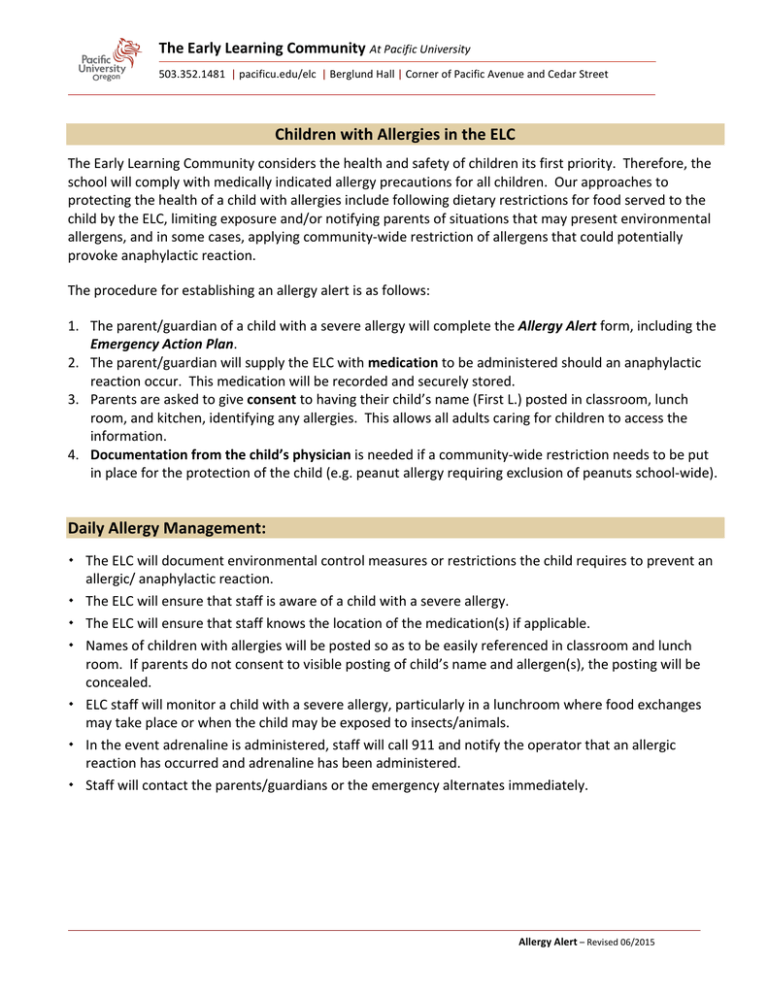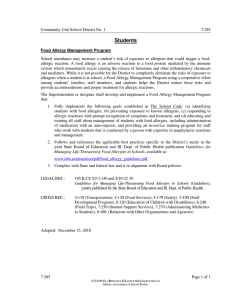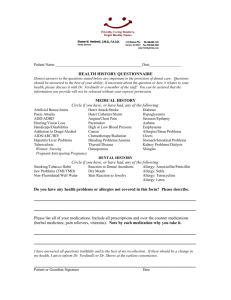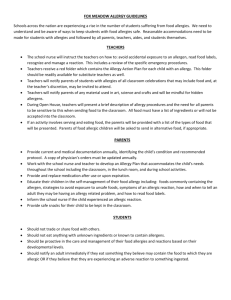Document 10816462
advertisement

The Early Learning Community At Pacific University 503.352.1481 | pacificu.edu/elc | Berglund Hall | Corner of Pacific Avenue and Cedar Street Children with Allergies in the ELC The Early Learning Community considers the health and safety of children its first priority. Therefore, the school will comply with medically indicated allergy precautions for all children. Our approaches to protecting the health of a child with allergies include following dietary restrictions for food served to the child by the ELC, limiting exposure and/or notifying parents of situations that may present environmental allergens, and in some cases, applying community-­‐wide restriction of allergens that could potentially provoke anaphylactic reaction. The procedure for establishing an allergy alert is as follows: 1. The parent/guardian of a child with a severe allergy will complete the Allergy Alert form, including the Emergency Action Plan. 2. The parent/guardian will supply the ELC with medication to be administered should an anaphylactic reaction occur. This medication will be recorded and securely stored. 3. Parents are asked to give consent to having their child’s name (First L.) posted in classroom, lunch room, and kitchen, identifying any allergies. This allows all adults caring for children to access the information. 4. Documentation from the child’s physician is needed if a community-­‐wide restriction needs to be put in place for the protection of the child (e.g. peanut allergy requiring exclusion of peanuts school-­‐wide). Daily Allergy Management: ­ The ELC will document environmental control measures or restrictions the child requires to prevent an allergic/ anaphylactic reaction. ­ The ELC will ensure that staff is aware of a child with a severe allergy. ­ The ELC will ensure that staff knows the location of the medication(s) if applicable. ­ Names of children with allergies will be posted so as to be easily referenced in classroom and lunch room. If parents do not consent to visible posting of child’s name and allergen(s), the posting will be concealed. ­ ELC staff will monitor a child with a severe allergy, particularly in a lunchroom where food exchanges may take place or when the child may be exposed to insects/animals. ­ In the event adrenaline is administered, staff will call 911 and notify the operator that an allergic reaction has occurred and adrenaline has been administered. ­ Staff will contact the parents/guardians or the emergency alternates immediately. Allergy Alert – Revised 06/2015 The Early Learning Community At Pacific University 503.352.1481 | pacificu.edu/elc | Berglund Hall | Corner of Pacific Avenue and Cedar Street Allergy Alert Child Name: Birthdate: Identify allergens and describe symptoms: FOOD ALLERGIES in detail: Symptoms if eaten: 1 1 Yes | No 2 Yes | No 2 Anaphylactic 3 3 Yes | No 4 4 Yes | No OTHER ALLERGIES: Type: Symptoms: Anaphylactic Insect bite/sting Yes | No Seasonal Yes | No Environmental/Other Yes | No Common signs of an anaphylactic reaction: ­ Flushing ­ Hives ­ Itching eyes, nose, face ­ Wheezing, coughing to breathe ­ Inability ­ Tingling of lips and mouth ­ Swelling of eyes and face ­ Swelling of throat ­ Vomiting/diarrhea ­ Dizziness/fainting ­ Weak pulse ­ Loss of consciousness Emergency Action Plan 1. Listen to the child and assess for above symptoms. 2. Give prescribed medications according to symptoms observed: Medication Name Instructions 3. Call 911 if symptomatic of anaphylaxis and Epipen administered. 4. Notify parents/guardians or emergency alternates. Parent/Guardian Comments / Special Instructions I consent to the Emergency Action Plan and administration of the prescribed medications as outlined above, and I consent to the non-­‐confidential posting of my child’s name (first, last initial) and his/her allergens in the school. Signature of Parent or Guardian Name printed Date Allergy Alert – Revised 06/2015


